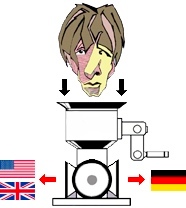Poll: In how many language pairs do you work? Persoa que publicou o fío: ProZ.com Staff
|
|---|
This forum topic is for the discussion of the poll question "In how many language pairs do you work?".
View the poll results »
| | | |
I work in four language pairs. I translate from English, French, Spanish and Italian (in this order amount-wise) exclusively into my native language: European Portuguese. Nowadays the majority of my work (+/- 80%) is in one combination (EN-PT), though some years ago there was a kind of balance among language pairs. Over the years I have noticed a big shift: when I started out some 40 years ago the demand for other languages (French, in the first place) was much higher. For instance, last year I ... See more I work in four language pairs. I translate from English, French, Spanish and Italian (in this order amount-wise) exclusively into my native language: European Portuguese. Nowadays the majority of my work (+/- 80%) is in one combination (EN-PT), though some years ago there was a kind of balance among language pairs. Over the years I have noticed a big shift: when I started out some 40 years ago the demand for other languages (French, in the first place) was much higher. For instance, last year I had next to no work (9,327 words) in IT-PT... ▲ Collapse
| | | | neilmac
Spain
Local time: 11:08
Spanish to English
+ ...
I translate ES-En and FR-EN. However, in the past decade or so, I've only had a few translations from French and the texts were short and unchallenging.
One of my clients has an online platform for translating software strings, and sometimes the odd thing will appear in languages like Portuguese or Italian, and I usually have a go at them as well, if I think I am able, as I usually know the context and if I can do it, I will.
| | | | Jan Truper 
Germany
Local time: 11:08
English to German
I only really work from English to German.
But in my main fields of work (games / subtitles), a lot of content from different countries gets localized into English first, before the English copy gets translated into other target languages.
So I have been translating many projects originating in various languages (Turkish, Farsi, Hindi, Spanish, Italian, Chinese, Japanese, Korean, Russian, French, etc.) into German -- all via English as a pivot language.
The English trans... See more I only really work from English to German.
But in my main fields of work (games / subtitles), a lot of content from different countries gets localized into English first, before the English copy gets translated into other target languages.
So I have been translating many projects originating in various languages (Turkish, Farsi, Hindi, Spanish, Italian, Chinese, Japanese, Korean, Russian, French, etc.) into German -- all via English as a pivot language.
The English translations I get are sometimes lacking in quality, so I have to pay a lot of attention to continuity and other factors, and oftentimes I have to get creative. For this reason, one of my selling points is that my translations make at least as much sense as the source text. ▲ Collapse
| | |
|
|
|
I practically only translate from Danish into English now. I have translated a fair amount from Swedish and Norwegian, and I still edit texts translated from Norwegian for a good client. She occasionally sends texts for translation from Norwegian too, and if I can, I take them on. I hardly ever translate from Swedish these days.
| | | | | |
I am certified in German to English and French to English.
| | | | Lincoln Hui 
Hong Kong
Local time: 18:08
Membro
Chinese to English
+ ...
|
|
|
Muriel Vasconcellos (X) 
United States
Local time: 02:08
Spanish to English
+ ...
My main combinations are Spanish-English and Portuguese-English. I worked in two international organizations that required translators to also be able to translate from French, and I have done that as well. In addition, I do a lot of editing of original English. In my job log I have a column for source language: S, P, or E. No F any more. Most years (but not always), S tends to predominate, followed by P, and then E, in that order. I would prefer to do more work from Portuguese, as it always rem... See more My main combinations are Spanish-English and Portuguese-English. I worked in two international organizations that required translators to also be able to translate from French, and I have done that as well. In addition, I do a lot of editing of original English. In my job log I have a column for source language: S, P, or E. No F any more. Most years (but not always), S tends to predominate, followed by P, and then E, in that order. I would prefer to do more work from Portuguese, as it always reminds me of my life with my husband.
I've been asked to work into Portuguese, but I insist on working into my native language except in the most informal situations. ▲ Collapse
| | | | Adam Warren 
France
Local time: 11:08
Membro (2005)
French to English
| Mainly French into English, but... | Aug 12, 2019 |
... like other colleagues no doubt, I have occasionally been pressed into service on short assignments in other European-language pairs - German, Spanish and Italian into English: there was no-one else around, and the work was in one of my specialist fields. I remember among others a one-page German document on tax - interesting going!
I actually only draft in UK English, but clients often wish me to handle work into US English. In such cases, I offer to spell the delivered draft in... See more ... like other colleagues no doubt, I have occasionally been pressed into service on short assignments in other European-language pairs - German, Spanish and Italian into English: there was no-one else around, and the work was in one of my specialist fields. I remember among others a one-page German document on tax - interesting going!
I actually only draft in UK English, but clients often wish me to handle work into US English. In such cases, I offer to spell the delivered draft in US, and ask the client to indemnify me against end-client claims relating to dialect.
In this connection, it is wise to keep careful record of exchanges with clients concerning an assignment, and for the purpose, my job folder set includes a 'Management' folder. Retaining proof avoids misunderstanding and conflict.
[Edited at 2019-08-12 06:40 GMT] ▲ Collapse
| | | | | One and a bit | Aug 12, 2019 |
Danish, Norwegian and Swedish are effectively the same language for translation purposes
| | | |
English -> Brazilian Portuguese
Japanese -> Brazilian Portuguese
German ->Brazilian Portuguese
| | |
|
|
|
English, French, Spanish, Dutch into Italian
| | | | Michele Fauble 
United States
Local time: 03:08
Norwegian to English
+ ...
| Scandinavian | Aug 12, 2019 |
Chris S wrote:
Danish, Norwegian and Swedish are effectively the same language for translation purposes
Helt enig. (“totally agree” in Danish, Norwegian and Swedish)
| | | | | Ja, det er rart... | Aug 14, 2019 |
Perhaps with tongue in cheek as usual
Chris S wrote:
Danish, Norwegian and Swedish are effectively the same language for translation purposes
… apart from the false friends!
My heading means ´Yes, that's nice´ in Danish, but quite the opposite in Norwegian.
There are others.
I tread carefully or turn down jobs where it may be critical, but I admit that my comprehensive Danish dictionaries are a very useful supplement to the somewhat sparser Norwegian ones I have.
When we carefully distinguish between different varieties of English or Portuguese or Spanish, I would prefer not to lump the three Scandinavian languages under one.
| | | | To report site rules violations or get help, contact a site moderator: You can also contact site staff by submitting a support request » Poll: In how many language pairs do you work? | Pastey | Your smart companion app
Pastey is an innovative desktop application that bridges the gap between human expertise and artificial intelligence. With intuitive keyboard shortcuts, Pastey transforms your source text into AI-powered draft translations.
Find out more » |
| | TM-Town | Manage your TMs and Terms ... and boost your translation business
Are you ready for something fresh in the industry? TM-Town is a unique new site for you -- the freelance translator -- to store, manage and share translation memories (TMs) and glossaries...and potentially meet new clients on the basis of your prior work.
More info » |
|
| | | | X Sign in to your ProZ.com account... | | | | | |


















